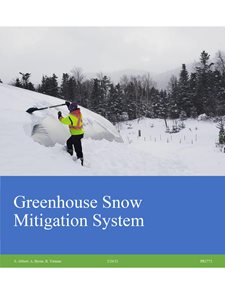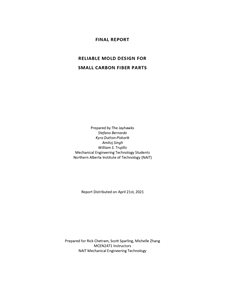2021 Technology Report Contest
2021 Technology Report Contest Winners
Technology Accreditation Canada (TAC) today announced the prize winners of its 2021 Technology Report Contest. Awarded the top prize of $1,000 are Stefan Abbott, Riley Yetman and Allyssa Byrne, graduates of the Mechanical Engineering Technology at College of North Atlantic, with their “Greenhouse Snow Mitigation System” report.
The contest, open to TAC and CTAB (Canadian Technology Accreditation Board) national accredited programs, saw twenty-four reports submitted. A panel of TAC auditors from select engineering technology and applied science disciplines formed judging panels to conduct an initial rating of the reports. The top two reports in each discipline group were assessed by a final judging panel of three certified professionals, each with extensive education, industry and audit backgrounds. Reports were scored on their topic selection, methodology/research, analysis, results/conclusions, originality/innovation and presentation.
The project idea of a greenhouse snow mitigation system was derived after speaking with program advisors who connected the students with their main point of contact, Sean Dolter, who presented the problem. The project goal was to develop a solution which would stand alone and operate independently of the greenhouse itself. “We are ecstatic to have been awarded the top prize of this year's technology report contest”, commented Allyssa Byrne on behalf of her teammates. “Working on this project enabled us to use what we have learned throughout the past three years in a real life scenario, which has proven to be instrumental in preparing us for a career after graduation by imposing critical thinking, problem solving and networking”.
“We are deeply proud of the high standards and successes achieved by our students and this achievement is a clear reflection of the high-quality education provided by the College of the North Atlantic” remarked Sonny Hegde, Dean, School of Engineering Technology, College of the North Atlantic. “As an integrative and culminating educational experience, capstone projects allow our students to demonstrate the knowledge and skills acquired in the engineering curriculum and apply it to real-world projects.”
Judges commented on the overall outstanding quality of the submissions, with many mentioning how much they learned. The final judging panel noted the winning project exhibits excellence in engineering design and problem solving. The methodology and steps to determining a solution was a great demonstration of the capability of an engineering technologist.
“I am very pleased to see Stefan, Allyssa and Riley win this prize as the capstone project was the result of eight months hard work in challenging circumstances”, expressed Andrea Scott, CET, Instructor, Mechanical Engineering Technology, College of the North Atlantic. “Demonstrating excellence in problem solving and integration of their mechanical engineering technology course work, the students completed the project for an industry partner and were able to offer a solution to a real problem”.
The team of Stefano Bernardo, Kyra Dutton-Piskorik, Amitoj Singh and William S. Trujillo from the Mechanical Engineering Technology program at Northern Alberta Institute of Technology collected the second place prize of $500. Judges found the pure technical development in their report, “Reliable Mold Designs For Small Carbon Fiber Parts”, was well executed with a strong demonstration that 3D printing applications and uses are still being revealed.
With their report titled “Structural Effects of Spray-Applied Polyurethane Foam Insulation Within a Wood Framed Wall Section”, the $300 third place prize was presented to the team of Harrison Hadford, Jordan Dyck and Sishminder Singh from the Civil Engineering Technology program at Lethbridge College. The literature review, development and establishment of testing structures and parameters, along with recommendations for further study, was a clear indication of critical thinking observed the judges.
“Once again, this year’s Technology Report Contest showcased the incredible student talent produced from national accredited programs” pronounced Richard Stamper, TAC Executive Director. “We thank students and program administrators for their participation and support.”
1st Place 2nd Place 3rd Place


.jpg.aspx?width=225&height=290)
Contest Details
Eligibility: One Technology Report submission per TAC or CTAB accredited program, written by one student or in a group up to four students, in their final year of their program
Report Criteria: Produce a written, minimum 3,000 word Technology Report, following general learning outcome GY01 Technology Report, which includes research, design, testing, analysis and conclusions related to a significant technology-related issue
Judging Criteria
| Category |
Particulars |
Grading |
| Topic |
Clearly identifies and defines a technical problem or issue |
10% |
| Methodology/Research |
Logically applies a technical methodology to attempt to solve the problem or address the issue
Compiles and integrates a wide range of research resources, including professionally published or peer reviewed literature, online tools, and interviews |
20% |
| Analysis |
Assembles, analyzes, and applies technical data
Integrate the processing, analysis and interpretation of technical data to conclude project |
20% |
| Results/Conclusion/ Recommendations |
Describes the results through the use of technology fundamentals, designs, data analysis and other appropriate techniques
Conclusions justified by research, analysis
Recommendations, where applicable, demonstrate additional critical thinking about the problem and solution |
20% |
| Originality/Innovation |
Includes independent and creative thought
Introduces a new idea, method or device |
20% |
| Presentation/Format |
Effectively compiles data by analyzing, translating and producing a cohesive report
Uses accepted principles of documentation, grammar, writing style, graphics and design |
10% |